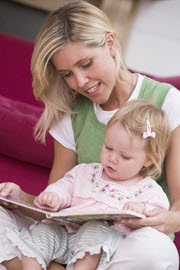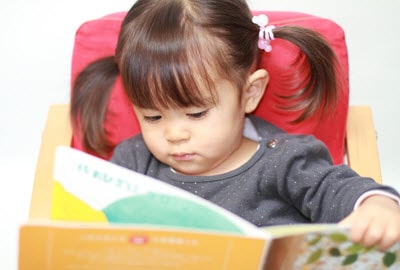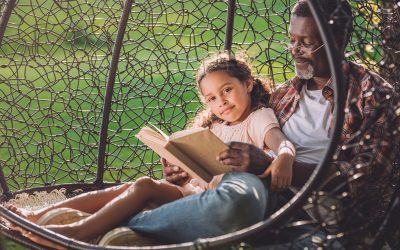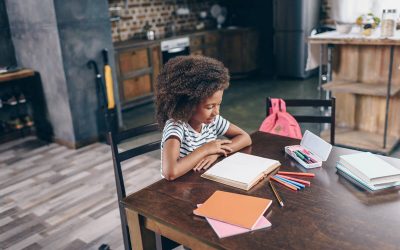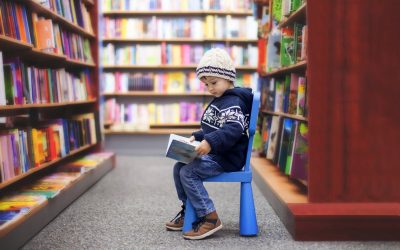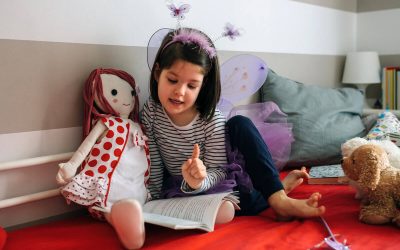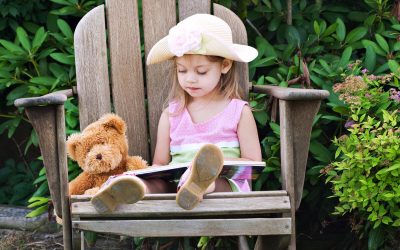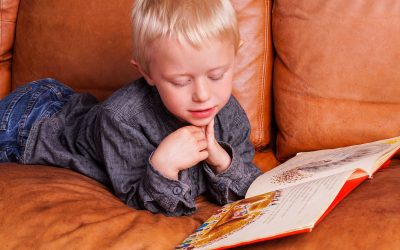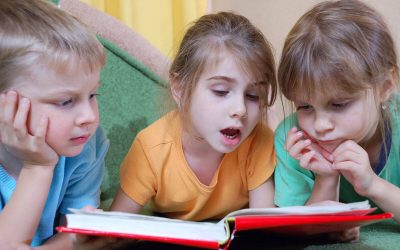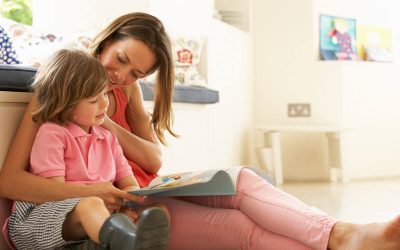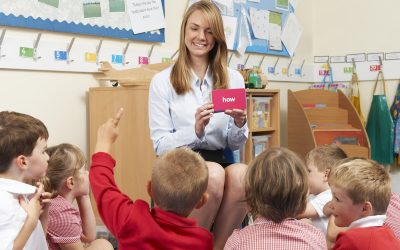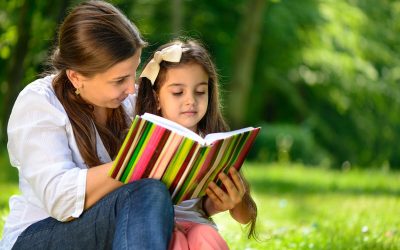How to Teach a 2 Year Old to Read: Our Recommendations
We all want our kids to have a leg up in life, and with the increase of technology, learning how to read is more important than ever.
You’re here because you want to know how to teach your 2-year-old to read, but it’s hard to know where to start.
In this blog post, we’ll see if two-year-olds can read and recommend ways to develop your little ones reading and literacy skills!
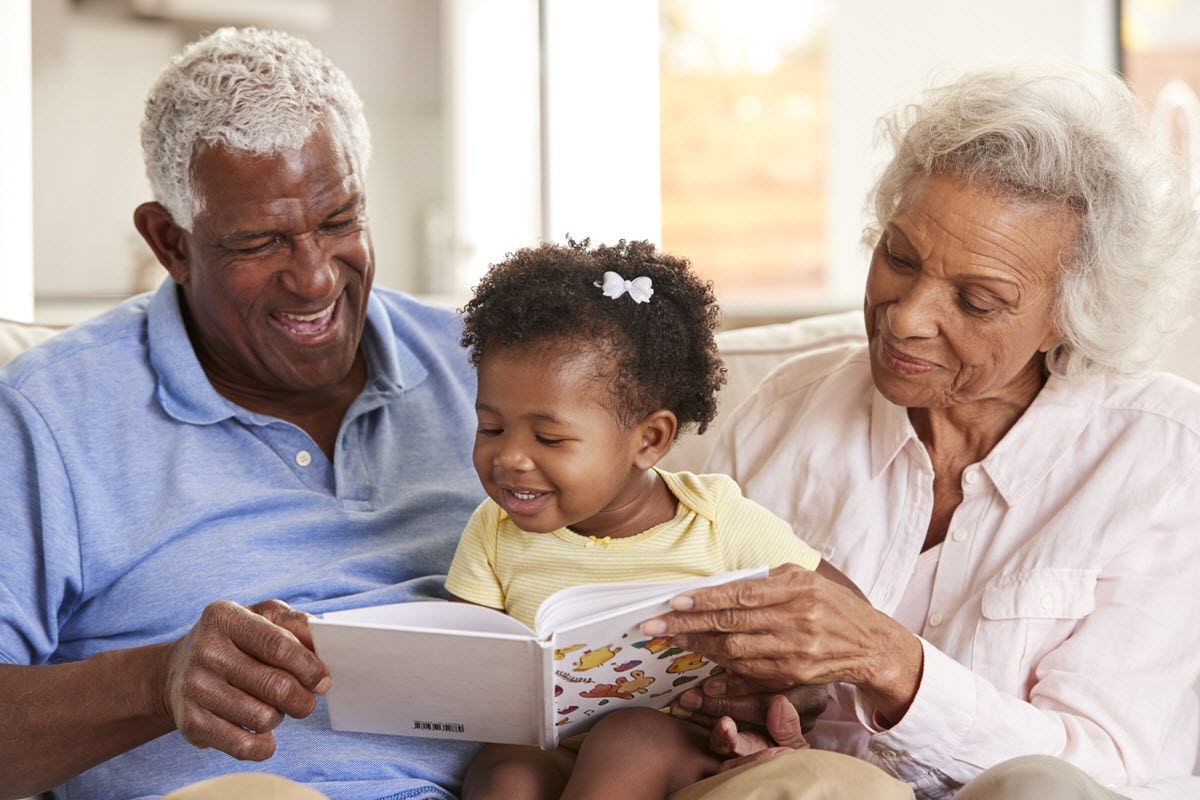
See Our Recommended Alphabet Toy for Two Year Olds
Can a child read at 2 years old?
Most kids learn to read between the ages of six and seven.
However, a 2-year-old can learn to read. Success requires patience, gentle repetition, and dedication from parents.
Keep in mind that there are no hard-and-fast rules of when a child should start reading because kids’ language development varies. But many factors go into whether or not a young child is ready, such as their level of attention, oral language acquisition skills, exposure to written words.
How 2 year olds learn
According to the National Association for Education of Young Children, play is a significant form of learning at this age. A large part of their development occurs without the need for formal lessons.
However, if you’re looking to start implementing reading lessons, a 2-year-old learns to read through repetition and dedication from the parent. They learn to read by seeing you read, being read to, learning the alphabet, reading a story repeatedly, or playing games with letters.
Before starting with direct reading lessons, you first need to check if your 2-year-old is interested in reading. So you must take the time to see if your child is receptive to learning how to read.
If they aren’t, wait a few months and try again.
Reading Readiness
Here are some of the language skills a 2-year-old should have which can help you determine their reading readiness:
- Following basic instructions
- Knowing the names of pets, siblings, and “mommy” and “daddy.”
- The ability to talk in short 3-4 word sentences
- Finishing sentences in rhymes, they’re familiar with
For more, read our article explaining the different reading milestones by age.
Whatever you do, make sure that you don’t force early reading; it can have disastrous consequences if your little one becomes put off by books altogether due to feeling pressured or otherwise frustrated during their first few lessons together as a parent-child duo.
These are supposed to be enjoyable and engaging experiences!
How to teach your 2-year-old to read
In this section, we will discuss the different ways to help develop your 2-year old’s literacy skills so that they can learn how to read.
Except for direct reading lessons, all of the tips below can be implemented with most 2-year-olds, even if they aren’t ready for explicit instruction. The earlier a child is exposed to these basic recommendations, the better.
Read to your child every day
Parents should use their fingers to trace along the words on the page when reading to children, so they begin connecting letters with what is being said.
At this age, they will mainly be interested in the pictures. However, as the months go by, their little minds start recognizing letters as meaning something more than just shapes or symbols on a page – but words that can tell an entire story!
Whenever you read a story, make sure that you use different voices for each character to make it a more engaging and fun experience. This will go a long way to instilling a love for reading that will last a lifetime.
Discuss the stories and ask questions
Encourage your child to look at pictures and ask them questions about what they see. You can do this by asking, “What color are these cars? What kind of animal is that over there?”
This will get them thinking about what is happening in the story and help to improve their comprehension skills.
Teach them about books
Teach them how to hold a book, read from left to right, and understand how they should turn the pages.
Young children often think that books are only for looking at pictures, so it’s important not to discourage exploration of the book but also make sure that you emphasize how reading is an interactive process where we can learn new things and even control how the story unfolds.
Recommended books for 2-year-olds
Simple storybooks
Simple storybooks are fantastic because they have big, easy words and colorful pictures on the pages. They also have very few words per page, so they’re perfect for children who are just learning how to read.
Try looking for books that feature a favorite character from their favorite television show or animal book with simple sentences and pictures of the animals doing what is written in the sentence. This way, your child will be familiar with both reading and following along.
Rhyming books
Rhyming books are great for 2-year-olds because they allow them to memorize the words by repeating them. They can also interact with the story by following along with the words and pictures.
Another point in favor of rhyming books is that most of them have three or four lines of text per page, making it easier for a child to follow along and see which line rhymes with the last one.
Read alphabet books
Alphabet books are a great way to show children that letters make up words and help them learn letter sounds.
Kids will enjoy looking at the pictures as you read aloud these simple stories about animals or objects, starting with different letters. They might also pick out words that begin with those same letters in other books after listening.
Developing phonemic awareness
Phonemes are sounds that make up the English language. They consist of consonants, short vowels, long vowels, and digraphs.
Phonemic Awareness consists of learning those letter sounds and how to interpret them within a word.
This skill will help your child learn sounds in words so they can read more easily and fluently and spell better. It will also help with their listening skills because they’ll hear sounds in words easier than before!
Here are some fun ways to develop phonemic awareness
Sing songs and nursery rhymes
Songs and nursery rhymes like Twinkle Little Star teaches children rhyming and helps them hear sounds and syllables in words, which can aid their ability to read.
Learning the alphabet and letter sounds
This is the age where kids usually develop an interest in the letters of the alphabet. Help them learn their names and the sounds that they make. You can also teach letter senses like recognizing uppercase letters from lowercase letters or seeing which ones have curved lines versus straight lines in different fonts.
Play with alphabet toys
Little ones will love exploring the world of letters with alphabet toys. They are great for getting your kids to get familiar with how they sound and their shapes.
Learn the alphabet song
Learning the alphabet song is a fun way to learn the letters and their sounds. Learning the alphabet will help kids to learn to read sooner. Sing it with your child, and you’ll be surprised how quickly they will learn their ABCs!
Get a phonemic awareness focused learn to read program
Phonemic awareness is essential to children’s reading ability because it helps children acquire and use the phonological system, which allows them to understand how words are created.
With a phonemic awareness-focused learning-to-read program, kids can make connections between letters and sounds as they read words. There are many programs out there, and they all have different features
One of the best learning-to-read programs we recommend is Children Learning Reading, as it’s based on developing phonemic awareness and teaching your little one to read fluently.
You don’t have to wait until your child is 3 or 4 years old before you start teaching them how to read.
By the time they are 2, a lot of their brain development has happened. They can make connections between letters and sounds which will help with reading comprehension later on in life.
Start early by reading books every day with them. Books that teach about different subjects like animals, transportation, colors, shapes, etc., ask questions as they go through the storybook together (even if it’s just one sentence), discuss what the book was about at dinner time over food or while getting ready for bedtime rituals.
And if your little one is ready for reading lessons, make sure you invest in a phonemic awareness-based reading program like Children Learning Reading which you can get here.
Why is Phonological Awareness Important?
Why is Phonological Awareness Important? You're probably wondering: Why is phonological awareness important? Phonological awareness is a critical skill for reading success. It includes hearing, identifying, and manipulating individual sounds in spoken words. In this...
Why Reading Aloud is Important for Your Kids
Why Reading Aloud is Important for Kids Reading aloud is a great way to help your child learn to read. However, many parents need to do it more often. In this post, we'll discuss the importance of reading aloud with your child and give tips for making it more...
What are Read Alouds? Definition, Purpose, and Tips
What are Read Alouds? Definition, Purpose, and Tips Are you familiar with read-alouds? If not, they are a great way to encourage children to learn. Read-alouds allow parents and educators to work with kids in a fun and interactive way. They can also help enhance...
Read Aloud Benefits: Why Reading Aloud With Your Kids is Crucial
Read Aloud Benefits: Why Reading Aloud With Your Kids is Crucial You've probably heard that reading aloud to your kids is one of the best things you can do for their development, but you might not know how to start. This post will teach you everything about read-aloud...
Reading Games for 2nd Graders
Reading Games for 2nd Graders Do you have a second grader in your life? If so, they are probably reading more than ever before. But that doesn't mean they don't need some fun while they are doing it! Here are a few things to consider regarding reading games for 2nd...
Comprehension and Reading Pages for 2nd Graders
Comprehension and Reading Pages for 2nd Graders Are you looking for comprehension and reading pages for 2nd graders? If so, you've come to the right place. In this post, we'll share valuable resources from around the web that provides PDFs, worksheets, and reading...
Reading Help for 2nd Graders
Reading Help for 2nd Graders Getting reading help for 2nd graders can be a daunting task. You don't want them to get discouraged, but you also don't want to overwhelm them with too much information at once. This post will show you easy ways to help your child improve...
Fun Reading Activities for 2nd-Grade Kids
Fun Reading Activities for 2nd-Grade Kids Reading is one of the most important skills your child will learn. Besides improving their reading comprehension, 2nd-graders who participate in fun activities are more likely to stay on top of their schoolwork and enjoy...
What Does Fluency Mean?
What Does Fluency Mean? Fluency is speaking and writing quickly or easily in a given language. This term comes from the Latin word fluentem, meaning "to flow." Fluency can be achieved through practice and immersion in a language. It is often measured by how well...
Why is Reading Fluency Important? The Role of Fluency in Your Child’s Development
Why is Reading Fluency Important? The Role of Fluency in Your Child's Development Why is reading fluency important for your child's development? Reading fluency is important because it gives your child time to focus on comprehension and not just word recognition. It...
The Best Books for 3-4 Year-Olds: Our Top Picks for 2022
The Best Books for 3-4 Year-Olds: Our Top Picks for 2022 Do you have a curious 3-4 year-old? Then read on! This is a crucial time for your little one's development. Getting ready to start school and learning more about how the world works. They'll also spend more time...
What’s the Average Age to Start Reading?
What's the Average Age to Start Reading? As parents, we worry about the average age to start reading. We're anxious our kids will be behind in their reading development when it comes time for school. Should our children start reading lessons as early as possible? This...
Reading Tips for Parents of 1st Graders: Help Your Kids Become Better Readers
Reading Tips for Parents of 1st Graders: Help Your Kids Become Better Readers Reading is one of the most essential skills your first grader can learn, and it starts early. But it doesn't have to be complicated! This post will show you our top 13 reading tips...
At Home Reading Programs: What’s Best for Your Child
At Home Reading Programs: What is Best for Struggling and Early Readers Every day, thousands of children struggle with reading because they don't have access to the right resources or learning programs. I'm sure you understand the importance of early intervention in...
Why Phonics is Important
Why phonics is important: Helping kids read and write better Phonics is a letter-sound-based approach to teaching reading and writing. This means that the alphabet letters are used as building blocks for words, which can be matched with their corresponding...
Why Do Some Kids Struggle With Reading? – Possible reasons and what to do about it
There are many reasons why some kids struggle with reading. And sometimes, it's not something that you can immediately fix. However, you can do things to help your child improve their skills and give them the confidence they need to have in themselves as readers. I...
How To Teach A 6 Year Old To Read Successfully
How to Teach a 6 Year-Old to Read Successfully Teaching a 6 year-old to read is one of the most important things you can do as a parent. It can affect their chances of employment, performance in school, and even their ability to live a happy life. However,...
Teaching a 3 Year Old To Read: Is it Possible?
Teaching a 3 Year Old to Read: Is it possible?You may be asking yourself, "Is teaching a three year old to read possible?" There are many questions as well as doubts about whether or not they can learn at this age. In this blog post, I will show you why teaching a...
Is it Possible to Teach Babies to Read? – Baby Literacy
Should you teach babies to read early on in life or teach them later when they’re older? The idea of teaching a baby to read is controversial. Some would say that it’s impossible, while others argue that it’s not too early to teach your child the basics skills they...
Sight Words vs Phonics. Which is Better for Your Kids?
Parenting is not easy. There are so many things to worry about when you have a child, and teaching them how to read can be one of the most challenging tasks. That's why parents need to know which method - sight words or phonics - is best for their children. Here, we...

Natalie is a full-time blogger and former elementary school teacher who specializes in helping parents teach their kids to read. With a qualification in Early Childhood Education, over 7 years of experience in education, and a passion for literacy, Natalie provides practical tips, activities, and resources for parents looking to support their child’s learning-to-read journey. She is the proud mom of two young readers and loves sharing her knowledge and experience with other parents. Natalie enjoys spending time with her family, reading, and exploring the great outdoors when she’s not blogging.

